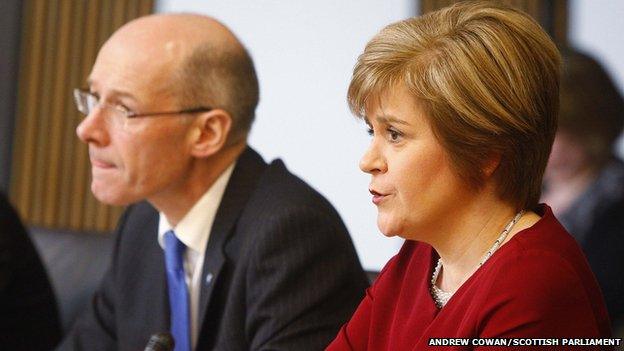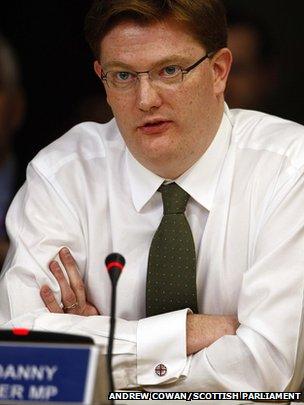Scottish independence: Finance ministers clash over mortgage and tax costs
- Published
Ministers from Holyrood and Westminster have clashed over the cost to households of Scottish independence.
Chief Secretary to the Treasury Danny Alexander said interest rate rises could see up to £5,200 added to the annual cost of a mortgage in Scotland.
Meanwhile, Finance Minister John Swinney said UK taxpayers might pay an extra £5.5bn each year to service the national debt, unless a deal is agreed.
Both ministers appeared before MSPs examining Scotland's economy.
A Scottish Parliament committee assessed Scotland's economic future ahead of the 18 September independence referendum.
Scottish government ministers said keeping the pound under a formal currency union - or "sterling zone" - was in the interests of both Scotland and the rest of the UK in the event of a "yes" vote.
UK Chancellor George Osborne has ruled out a currency union, a position backed by Labour and the Liberal Democrats.
Scottish ministers have suggested they might not take on a share of the UK's debt if there was no deal on sterling in the event of independence.
Mr Alexander told Holyrood's economy committee the "likely volatility" of a new Scottish currency would lead to higher interest rates.
He added that if Scotland refused a share of UK debt post-independence, it would lead to higher international borrowing costs.
Mr Alexander said: "In the event of a default, or a refusal to accept debt, one bank, Jefferies investment bank, has done the only detailed estimate out there - they have suggested that under those circumstances there would be a premium of more like five percentage points in that default scenario.

John Swinney and Nicola Sturgeon said there was no evidence to support Mr Alexander's claims
"Assuming a 75% pass through from bond rates to mortgage rates, that would be an extra cost of about £5,200 on an average mortgage cost in Scotland."
Mr Alexander claimed this could have "a huge effect on mortgages and businesses".
The UK government has warned that, even if a new Scottish state accepted its share of UK debt, it would have to pay an "independence premium" to borrow from the markets, leading to an extra £1,700 a year for the average mortgage-payer.

Danny Alexander raised concerns about the effect of independence on mortgages and businesses
Mr Swinney said failure to agree a deal with an independent Scotland on the division of liabilities and assets - including the pound - could result in the remainder of the UK having to pay up to £5.5bn more a year in debt servicing costs.
That, the Scottish finance secretary added, would be the equivalent of increasing income tax by one penny for people in the rest of the UK.
Appearing at the committee after Mr Alexander, he told MSPs: "If we follow the logic of the Treasury's position, the Treasury is walking into the payment of an extra £4 to £ 5.5 billion a year in debt interest charges to sustain up to an extra £130 billion of debt.
"Under the proposition we have put forward, an independent Scotland would be quite happy to pay, as part of negotiated arrangements which would include participation in a sterling zone."
Deputy First Minister Nicola Sturgeon, appearing alongside Mr Swinney, rejected the UK government's claims on interest rates.
She told the committee there was "not a scrap of evidence" that borrowing costs would be higher, and that Scotland would continue to benefit from an "integrated financial services market, one of the reasons we propose remaining in a currency zone".
Ms Sturgeon added: "There are examples of other small European countries that have lower mortgage costs than people in Scotland as part of the UK right now."